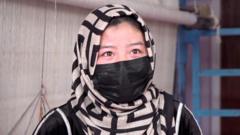With educational opportunities severely limited since the Taliban's takeover in 2021, Afghan girls and women are increasingly relying on the low-paid carpet weaving industry. Despite their lacking wages and harsh working conditions, many remain determined to pursue education and support their families.**
Afghan Women Embrace Carpet Weaving Amid Educational and Economic Crisis**

Afghan Women Embrace Carpet Weaving Amid Educational and Economic Crisis**
As the Taliban's restrictions on education for girls persist, many Afghan women turn to carpet weaving as a means of survival and economic support for their families.**
In the heart of Kabul, a workshop buzzes with the movement of nimble fingers weaving intricate patterns into vibrant carpets. Among the throng is 19-year-old Salehe Hassani, who reflects on the harsh reality faced by girls like her since the Taliban assumed power in 2021. "The circumstances have taken education from us; we had no choice but to come here," she laments, her smile barely masking the weight of her situation. Under Taliban rule, educational institutions have remained largely closed to girls over the age of 12, forcing many into low-wage labor, chiefly in carpet weaving—a sector still open to women.
The carpet industry employs roughly 1.2 to 1.5 million Afghans, with women making up nearly 90% of the workforce, according to the UN. Even as the economy has shrunk drastically, with the UN warning of a "complete collapse," the carpet export industry has flourished. In the first half of 2024 alone, carpets worth approximately $8.7 million were sent overseas to countries such as Pakistan, India, and the United States, despite local wages barely meeting basic needs. The weavers report earning around $27 for a square meter of carpet, a figure that takes a month of labor to achieve—often translating to less than a dollar a day for their long hours.
Nisar Ahmad Hassieni, owner of Elmak Baft company, has sought to support the women by paying them better rates of approximately $39 to $42 per square meter while offering regular work hours. Nevertheless, the realities of the market mean many weavers see little of the profits from high-value sales, highlighting a dire disconnect between the booming export business and the feminized labor force powering it.
For many women like Shakila, 22, and her sisters, carpet weaving is not just a job, but a lifeline. Once aspiring for careers in law and journalism, the Taliban's actions have forced them into the loom, laboring in shared rooms with their family in Kabul's impoverished neighborhoods. Traumatic memories from a bomb attack at their school only intensify their plight; their father’s decision to withdraw them from school out of fear after that tragedy now seems a commanding factor of their daily lives.
Despite this, some women remain hopeful. Salehe stands out among her peers, committed to continuing her education in secrecy, having studied English for three years on her own initiative. "We refuse to stop learning, no matter what obstacles there are," she states with unwavering confidence. Her dream is to become a doctor and provide much-needed healthcare in Afghanistan.
As the Taliban maintains its strict educational policies, Afghan women's resilience shines bright amidst their challenging circumstances, underscoring a collective determination for a better future.






















